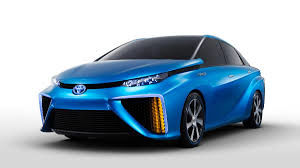Toyota Mirai Fuels Hydrogen Future
April 22 2015, Bolton Toyota

Earth Day 2015 Marks Turning Point in Zero-Emission Vehicles
Fifteen years ago, a little hybrid no one knew rolled onto the National Mall in Washington, DC to celebrate Earth Day. That hybrid - the Toyota Prius - kick-started one of the most intriguing eras in automobile history. As the 45th Anniversary of Earth Day approaches on April 22, the future of zero-emission manufacturing appears to be at a turning point.
Electric vehicle demand in the past five years has soared in North America and worldwide, reaching more than 700,000 total plug-in vehicles (plug-in hybrids and pure battery electrics), up from about 400,000 at the end of 2013.
A major reason for the rise in EV sales is the rapid drop in the cost of the key component -- batteries. A recent study entitled "Rapidly Falling Costs Of Battery Packs For Electric Vehicles" reported that battery cost per kilowatt hour (kwh) fell from more than $1,000 per kWh to approximately $410 per kWh between 2007 and 2014. The International Energy Agency estimates that cost parity between electric and internal combustion engine vehicles could be achieved when battery costs hit $300 per kWh of storage capacity. Experts believe that batteries will sell for less than $230 per kWh within two or three years. "If costs reach as low as $150 per kilowatt hour this means that electric vehicles will probably move beyond niche applications and begin to penetrate the market more widely, leading to a potential paradigm shift in vehicle technology", the research study reported.
In fact, every indication is that battery costs could be the single strongest factor in determining the mainstream adoption of green vehicles. This prediction is a big reason why Tesla Motors and Panasonic have broken ground on a massive $5 billion plant capable of producing half a million battery packs annually, with the goal of reducing overall battery costs by 30%.
Conversely, Toyota has officially rolled out what could be a major development in automotive history - a sleek, affordable, eco-friendly car of the future. Toyota has been ranked as one of the most environmentally friendly car companies, due to its leading position in the development and production of hybrid gas-electric vehicles. The "greening" of the Toyota brand began in earnest with the introduction of the Prius. As one of the more recognizable gas-electric hybrids, it can be traced back to 1992 when Toyota committed to a corporate "Earth Charter." The vehicle was introduced in Japan in 1997 and imported to the United States a short three years later. More recently, however, the company has backed off a strong push into battery electric cars and is touting hydrogen fuel cell vehicles as a solution for the next 100 years.
The Toyota Mirai ("future" in Japanese) is one of the first mass-market cars to run on hydrogen fuel cells. Like battery electric vehicles, fuel cell electric vehicles are powered by electricity, but instead of storing and releasing energy, fuel cells create electricity as long as it is supplied with fuel in this case in the form of hydrogen and oxygen. Instead of requiring an overnight charge like existing batteries, the Mirai can reach a full charge in about three minutes. "The Toyota Mirai represents a turning point in automotive history," said Bob Carter, senior vice president, automotive operations, Toyota Motor Sales, U.S.A., Inc.
Starting next year, Toyota plans to sell the Mirai for about $45,000 in the U.S. (including $13,000 California incentives) It will begin selling to Japanese consumers as early as next month. At 300 miles, the four-seat Mirai boasts the longest range of any electric vehicle on the market.
Predictably, Elon Musk, the electric-car pioneer and founder of Tesla Motors (maker of battery-powered Model S - 265-mile range) is a critic of hydrogen fuel cells, dubbing them "fool cells". Musk's main problem with hydrogen is that it's too difficult to produce, store and transform in fuel.
"If you're going to pick an energy source mechanism, hydrogen is an incredibly dumb one to pick," Musk said last month in Detroit. "The best-case hydrogen fuel cell doesn't win against the current-case batteries. It doesn't make sense, and that will become apparent in the next few years", Musk recently proclaimed in Detroit.
None of Musk's criticism seems to bother Toyota. The company is sponsoring an event in New York, Los Angeles and more during the month of April to engage and educate customers about fuel cell technology and hydrogen power. "After more than 20 years of research and development, we are excited to bring Mirai to American driveways. Earth Day 2015 is a great platform to educate the public about hydrogen fuel cell technology and the potential of hydrogen as a future fuel", says Toyota's SVP Carter. The Japanese automaker has partnered with Earth Day Network to sponsor the Global Citizen 2015 Earth Day celebration, April 17, 18 and 19, featuring environmental voices, government leaders, star-studded performances and a Mirai activation.
"Toyota has been a committed partner in creating solutions and momentum for a cleaner, better planet," said Kathleen Rogers, president of Earth Day Network. "We are proud to help educate about the possibilities for fuel cell technology and advocate around a shared vision for the environment."
While the final technological platform that propels zero-emission vehicles into the mainstream remains a debate, one thing is certain. Whether it's next-generation electric batteries or hydrogen, the environment and consumers will be the main beneficiaries.



